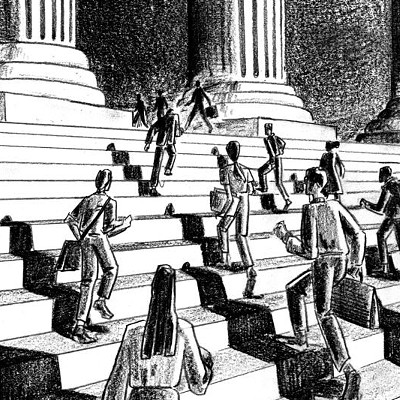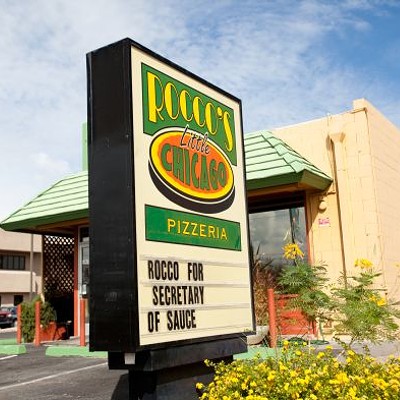But those haven't always been the draws in this backcountry community, nestled hard against the Santa Rita Mountains. Indeed, these hills remain pockmarked by the trappings of an earlier era, when mining was the region's economic mainstay. When those mines dried up, residents spent subsequent years hammering together a new prosperity based on tourism.
However, soaring ore prices have again sent prospectors back into the valleys and woodlands around Patagonia. By far, the largest among them is Canada-based Augusta Resource Corporation, which hopes to dig a huge strip mine in the Rosemont Valley, not far from Boling's B&B.
A 33-year resident of this area, she says mines like the one planned by Augusta are no longer welcome: "Patagonia is definitely a tourist destination, and we're right on the edge of a national forest. We get birders and hikers, and there aren't many places like this left."
Although Boling isn't among the opponents actively fighting Augusta's plans, she did sign a petition to stop the project. "I'm not against mining," she says. "I just want them to do it right."
But she also scoffs at the notion, promulgated by Augusta officials, that a mine in the Rosemont Valley would somehow plump Patagonia's economy. "From what I hear, the mine wouldn't have that many high-paying jobs," she says. "And they probably wouldn't get their workers from this area, anyway."
In fact, developing that mine could have a negative impact on tourism-based businesses such as Boling's Black Dove, according to a report released last week by the Tucson-based Sonoran Institute.
The mine would not be an economic booster for the area, say institute researchers. Instead, it would take a heavy toll on tourism and property values. "Tourism and travel-related economic activity is crucially important to the economy, particularly in rural areas where the (proposed) mine is located," says Ian Wilson, a spokesman for the Sonoran Institute. So important, he says, "that even a 1 percent impact on tourism spending in that area would more than offset the total annual benefits associated with the mine."
Those benefits are estimated at around $20 million.
Still, Rosemont proponents argue that mining jobs are much higher-paying than employment in hotels or restaurants. In an earlier interview, Augusta Vice President Jamie Sturgess also downplayed the environmental impacts of the proposed mine, and the concerns of neighboring residents. "I think it's a challenge to make any kind of development," he told the Tucson Weekly, "whether it's a mine or a highway or a subdivision--anything that is seen by some members of the public as changing their scenery or surroundings."
That perspective isn't very popular with folks such as Boling. Nor does it bode well for her scenery-based business, according to the institute study.
The research was commissioned by Save the Scenic Santa Ritas, a group opposed to the mine. It notes that rural parts of Pima County and Santa Cruz County--typical of similar areas across the West--have seen a sharp decline in traditional extractive industries such as mining. Instead, those economies are increasingly driven by "quality-of-life considerations or amenities such as clean air and water, outdoor recreational opportunities" and low crime rates.
Mining may not have a direct impact on crime rates. But it sure can wreak havoc on that rural economic engine, says Wilson. While mine jobs might pay well, "We're saying that when you look at the overall economic impact, the benefits are very small."
He argues that rural communities such as Patagonia endured many lean years in mining's aftermath, and they slowly built a tourist trade in its place. To now dig a huge pit in the heart of their cash cow would be financially destructive. At the same time, the mine would present huge infrastructure costs, such as the impact on surrounding roads by industrial truck traffic, and a potential $10 million price tag for local schools to serve a surge in students.
That occurs against the likely backdrop of decreasing values for properties around the mine, particularly in the second-home market. "Qualitatively, we're hearing that already," says Wilson. "People don't want to move here, because they hear there's going to be a mine in the Santa Ritas."
Ironically, by the time these fiscal challenges would finally be met, the mine's lifespan could be nearly over. Taken together, the negatives point to the Rosemont Mine as a losing proposition for the area, says Wilson. "Mining is just not sustainable longer-term. The (Rosemont) mine would open, and it would be worked, and it would be closed over 20 years.
"This is an area where, historically, mining was an important economic activity. But a lot of that has dried up over the last 50 years or so." Since then, "those communities, in that part of Pima County, have made a very slow and somewhat painful transition to an eco-tourism based economy. In fact, some of them have transitioned quite well. It's the New West, and people are not necessarily moving into those areas for jobs. They're moving there for the lifestyle."
The bottom line, he says, is that the Rosemont Mine could do far more harm than good for its neighbors. "What we're saying is that those communities have reinvented their local economies. And in the long term, it's much more sustainable for that region than a 20-year hit with the mine."
Back at the Black Dove B&B, Geraldine Boling says her community worked hard to attract tourists. Now they don't need a mine to arrive with the promise of jobs--and the specter of environmental destruction.
She notes that the hills around Patagonia are pitted with the overgrown remnants of earlier promises: "They never clean up their mess. And we're still living with it today."












